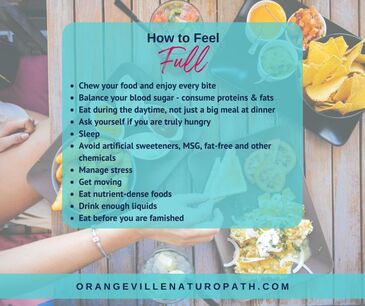Hunger comes predominantly from the release of the hormone ghrelin, mainly by the stomach, but there are many other physical and hormonal mechanisms at play in hunger and appetite signals.
Fullness comes from the hormone leptin, as well as stretch receptors that tell your body that you are full, via the vagus nerve.
(Digestion is a very complex process, which I am completely oversimplifying in order to provide you with tangible tips.)
In order to feel full and satisfied:
- Balance blood sugar
- consume proteins, fats and complex carbohydrates like vegetables for sustained energy - Chew your food
- enjoy every bite - Don't starve all day
- some people undereat all day, and then have a huge meal at dinnertime - Ask yourself if your body is ready to stop, and if you are still hungry
- identify physical need versus emotional need - Avoid chemicals
- artificial sweeteners, MSG, fat-free and other food additives interfere with our normal signals - Get enough sleep
- cravings for quick energy (sugar & simple carbohydrates) are common when tired - Manage stress
- cortisol can change appetite - Move
- exercise can change appetite & metabolism, but it also improves mood and alleviates boredom - Eat nutrient-dense, whole food (unprocessed)
- higher fibre for satiety, and higher nutrient content - Food is your fuel
- the better quality, the more efficient your engine - Drink enough liquids
- the body can mix up thirst and hunger cues - Eat at the table, not at your desk or in front of a screen
- keep your brain involved in the process
Most filling foods:
- Beef
- Chicken
- Fish
- Eggs
- Vegetable carbohydrates - broccoli, spinach, cauliflower, kale
- Oatmeal
- Potatoes/squash/sweet potato
- Greek yogurt & cottage cheese
- Nuts & seeds
- Avocado
- Quinoa
- Legumes/Beans
Note: excessive hunger can also be a sign of thyroid disease, diabetes, and medication side effects (anti-depressants, anti-histamines, and others), and appetite can change based on gastrointestinal disorders and emotional well-being as well. All of these things are important considerations.
Choosing health everyday,
Dr Christa


 RSS Feed
RSS Feed